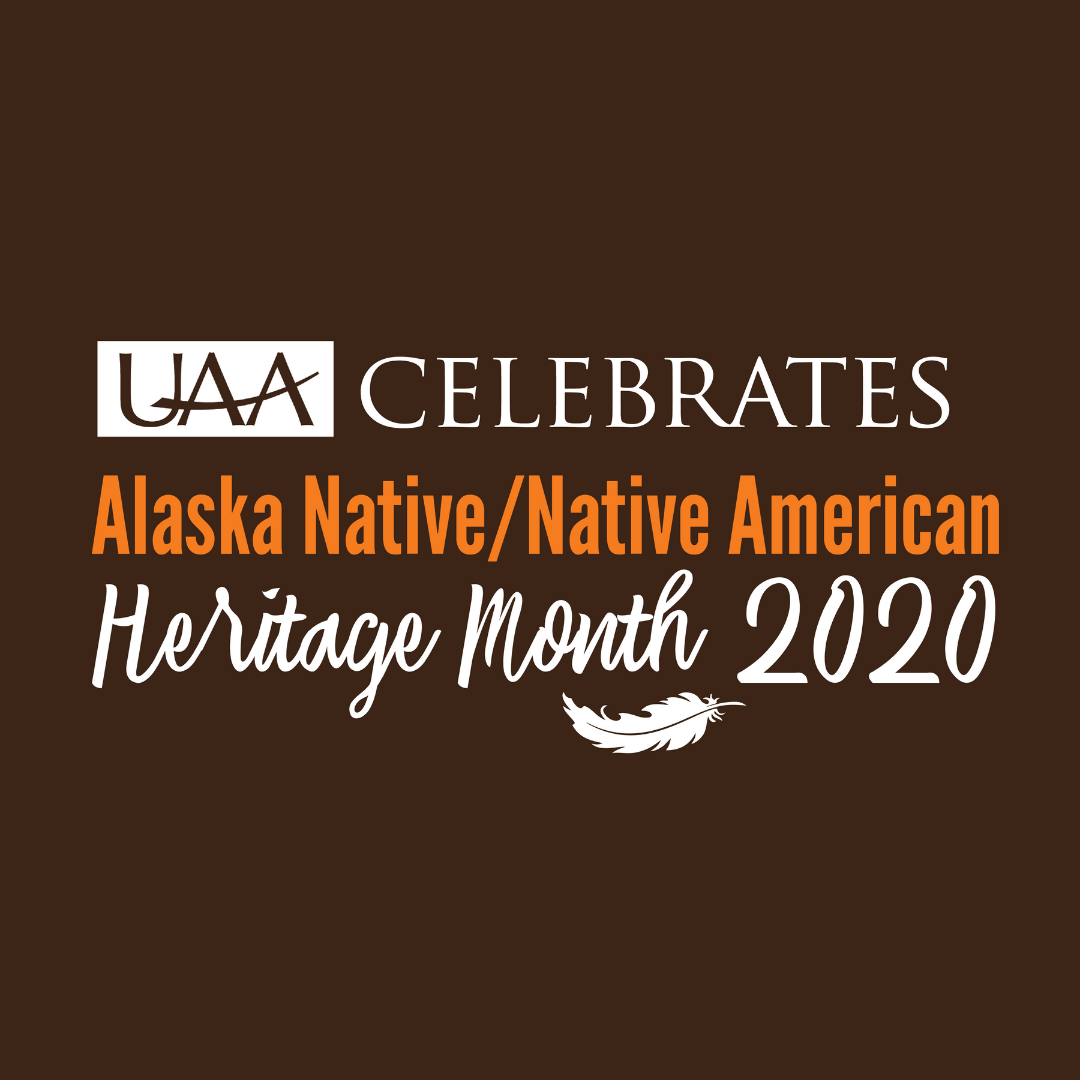Diversity Programs and Resources
-
Pride Month (June)
At UAA, valuing diversity is integral to excellence. Diversity maximizes our potential for creativity, innovation, educational excellence, and outstanding service to our communities.
We honor diverse experiences and perspectives—including differences in sex, gender identity, gender expression and sexual orientation—and strive to create welcoming and inclusive learning environments where all are treated with respect.
PRIDE refers to a celebration of all things lesbian, gay, bisexual, transgender (LGBT), as well as two-spirit, asexual, intersex, non-binary, queer and beyond (2S+)! This includes LGBT2S+ history, music, fashion, celebrities, entertainment, culture and civil rights movements. PRIDE events are usually celebrated in June to celebrate the Stonewall riots in June 1969, when patrons of a New York gay bar protested and fought for their right to peacefully congregate.
You can learn more about the history of Pride movements at the History Channel website.
At UAA, we celebrate our community with PRIDE everyday! This includes supporting students through the student organization The Family, employee pro-social groups, history (October) and pride (June) month events, preferred name/gender pronoun selection in Banner, gender neutral restrooms, an LGBTQIA2S+ Advisory Committee, and gender-neutral student housing.
Pride Month Events
June 15 | 5:30pm | Student Union Plaza | Sunshine and Sandwiches Walk
June 22 | 11:30am | Virtual | Lavender Leaders Panel
Coming Soon | Being QTBIPOC
June 30 | 4:00pm| Location to be announced | MSS Community Art ProjectSponsors: Student Life and Leadership, Student Activities, Multicultural Student Services, Chief Diversity Officer, UAA/APU Consortium Library.
-
APIDA Heritage Month (May)
UAA is proud to celebrate Asian American, Pacific Islander, Desi American (APIDA) Heritage Month. May was officially designated as APIDA Heritage Month in 1992. During this time, communities around the country celebrate the histories and contributions of Asian Americans and Americans from the Pacific Islands. These communities represent vastly diverse ethnicities, cultures, languages and histories in the United States.
The first Asians recorded in the US, on the West Coast in 1587, were from the Philippines. This was followed by Indians (East Asian, not Native American) at Jamestown, and the Chinese and Japanese in Hawaii at the turn of the 19th century. At the end of the 1800’s, people from Korea, Guam, Samoa and Vietnam all came to mainland US as well.
Much like in recent news, nationalist treatment of APIDA communities have long been frought with discrimination. The Chinese Exclusion Act, Japanese Internment during WWII, the colonization of Hawaii, Samoa and Guam, have caused great harm to these communities. Despite these atrocities, AAPI communities have made massive contributions to the success of the US in science, civil rights, technology, medicine and more. -
Diversity Month (April)
Program: Stand Against Racism Challenge (YWCA)
Virtual learning tool designed to create dedicated time and space to build more effective social justice habits, particularly those dealing with issues of race, power, privilege, and leadership. Participants will have the opportunity to log on to the challenge via phone app or by visiting the challenge website and are presented with challenges such as reading an article, listening to a podcast, reflecting on personal experience, and more!
Register here
Program: Shared Equity Leadership Program Introduction
Join the Chief Diversity Officer for a discussion about an exciting new leadership development program called the Shared Equity Leadership Seminar. Shared Equity Leadership is a model of equity promotion endorsed by the American Council of Education (ACE), and our accreditor, NWCCU. The model includes a.) examination of one’s personal journey, b.) an examination of values and c.) practices integral to equity work. Faculty and staff can earn a Shared Equity Leadership Certificate beginning Fall 2022. Come learn about this program!Monday April 4, 2022 10-1030 am OR
Tuesday April 12. 2022 3-30 pm -
Previous Celebrations
- 2021-2022 Academic Year
-
Women's History Month (March)
Women’s History Month celebrates the unique contributions of women to American history. Women’s history month started as a week of celebration by a school district in California in 1978. The event grew until lobbyists convinced President Carter to declare a national week of celebration in 1980. In 1987, Congress declared March Women’s History Month.
Some major contributors to Women’s history include Susan B. Anthony, Sojourner Truth, Rosa Parks, Gloria Steinem, bell hooks, and so many more. Check out the amazing women’s history timeline from the History Channel to learn more about American women leaders throughout the decades. Alaska has also been a contributor to American women’s history through the work of many indigenous women trailblazers. Learn more (Not Available) about the contributions of Agnes Brown, Katie John, Elizabeth Peratrovich, Alberta Schneck Adams, and Clara Swan.
*Women's History Month celebrates those who identify as women, femme, trans, and non binary.

-
Black History Month (February)
Black History Month started out in the United States in the ‘20s as a week that celebrated the birthdays of Abraham Lincoln and Frederick Douglass. Black History Month (BHM) was first celebrated as a full month in 1970 at Kent State University in Ohio. The month was recognized by the President of the United States in 1976.
Since then, Black History Month, sometimes referred to as African-American History Month, celebrations have included information on important historical events as well as leaders in African-American history such as Frederick Douglass, Harriet Tubman, Martin Luther King Jr., Malcolm X, Rosa Parks, James Baldwin and more.
In 2016, the U.S. opened the National Museum of African American History and Culture. It is the only national museum devoted exclusively to the documentation of African American life, history, and culture. You can explore the vast history of African Americans and attend virtual BHM events by checking out the museum’s extensive website.
In Alaska, African Americans have been a part of all aspects of development of the state going back almost two hundred years. This includes whaling, the military, engineering, building, and more. In 2020, UAA History professor Dr. Ian Hartman published Black History in the Last Frontier highlighting the achievements and contributions of Alaska’s Black community, while demonstrating how these women and men have endured racism, fought injustice, and made a life and home for themselves in the forty-ninth state. The book is available free for download from the National Park Service.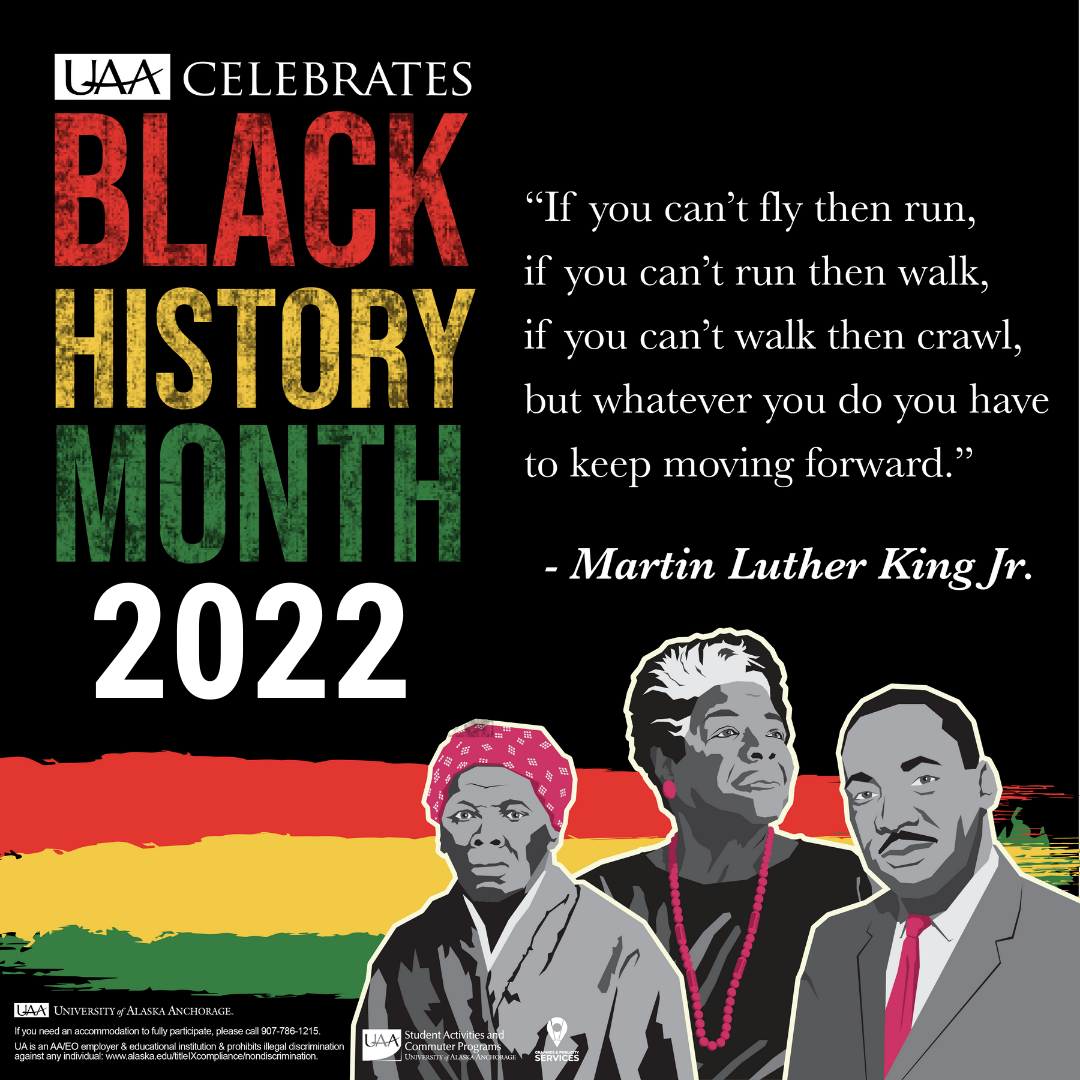
Black History Month EventsFeb. 4 | 11:30am | Virtual | Chancellor's MLK Student Appreciation Celebration
Feb. 5 | 12pm | Anchorage Museum Theater | Colorism
Feb. 11 | All Day | Free cupcakes at Eva's Cupcakery
Feb. 16 | 1:00pm | Virtual | "For the Rights of All: Ending Jim Crow in Alaska" Screening & Discussion
Feb. 17 | 7:00pm | Cinemark 16 | UAA at the Movies: The Harder They Fall (Black History Month Film)
Feb. 18 | All Day | Free popcorn at Jazzy Gourmet PopcornFeb. 23 | 5:00pm | Virtual | Conversation Café: The Politics of Being BIPOC at Work
Feb. 25 | 7:00pm | Student Union Den | Free Karaoke & Comedian: Alex BabbitUAA / APU Consortium Library | Black History Month
Student Life and Leadership, Multicultural Student Services, Student Activities, Black Student Union, UAA/APU Consortium Library.
-
Alaska Native/Native American Heritage Month (November)
UAA is proud to celebrate Alaska Native/Native American Heritage Month. In 1990, George H.W. Bush declared November to be Native American Heritage Month. It is now more commonly referred to as American Indian and Alaska Native Heritage Month. It is a time to celebrate the rich and diverse American Indian and Alaska Native histories and heritage, as well as educate ourselves about the historical and lived experiences of indigenous peoples who live(d) on the lands which became the United States.
There are five-hundred seventy-four (574) federally recognized American Indian and Alaska Native groups. Two-hundred and twenty-nine (229) of these groups are in Alaska. There are also hundreds of groups without federal recognition, who may have state recognition or no recognition at all.
In the lower 48, tribal nations are represented in 35 states across 334 recognized reservations. The current location of these sovereign nations and their lands is based on 500 years of colonization, removal, government treaties, and reorganization. The civil rights era of the 1960s saw movements for self-determination and self-government for American Indian nations. Today, seventy-eight percent of those who identify as American Indians live outside tribal lands. As of the last census AI/AN persons made up only 1.7% of the total US population, but are one of the fastest-growing populations with a 39% increase over the previous Census.
Alaska has a rich history of indigenous cultural practices. There are about 20 indigenous languages spoken in Alaska, and 11 of them are Dene’ or Athabascan, who are related to the Navajo and Apache in what is now New Mexico and Arizona. There 5 Inuit based languages; the Inupiaq of northern coastal Alaska, the Yupik of Saint Lawrence Island, the Yup’ik and Cup’ik of the Yukon-Kuskokwim region and Bristol Bay, the Sugpiaq or Alutiiq of Kodiak and the Alaska Peninsula, and the Unangax or Aleut of the Aleutian Chain, and there are the Eyak, Tlingit, Haida, and Tsimshian of the southeast archipelago. All of Alaska’s diverse indigenous populations have experienced difficult and dynamic transitions into the western culture and economy. The harshness of the geography and the lack of saleable resources in much of our state has left a few of Alaska’s indigenous cultures more intact if that were not the case. Annette Island, home of Alaska’s Tsimshian people, was developed before the Indian Reorganization Act of 1934, so it stands as the only reservation in Alaska. The rest of Alaska Tribes and Nations are organized into 12 Regional Corporations, Village Corporations and Tribal Nations due to the Alaska Native Claims Settlement Act (ANCSA) of 1971.
For more information on the diverse experiences and cultures of American Indians/Alaska Natives check out these resources:
National Congress of American Indians
Alaska Native Heritage Center
Native Movement
National Museum of the American Indian
Alaska Native Knowledge NetworkAs always, when you are celebrating a culture that differs from your own, be sensitive to avoiding stereotypes about that culture. It is important to be aware of the difference between cultural appropriation and cultural appreciation so that we are honoring and respecting other people’s values, beliefs, and norms.
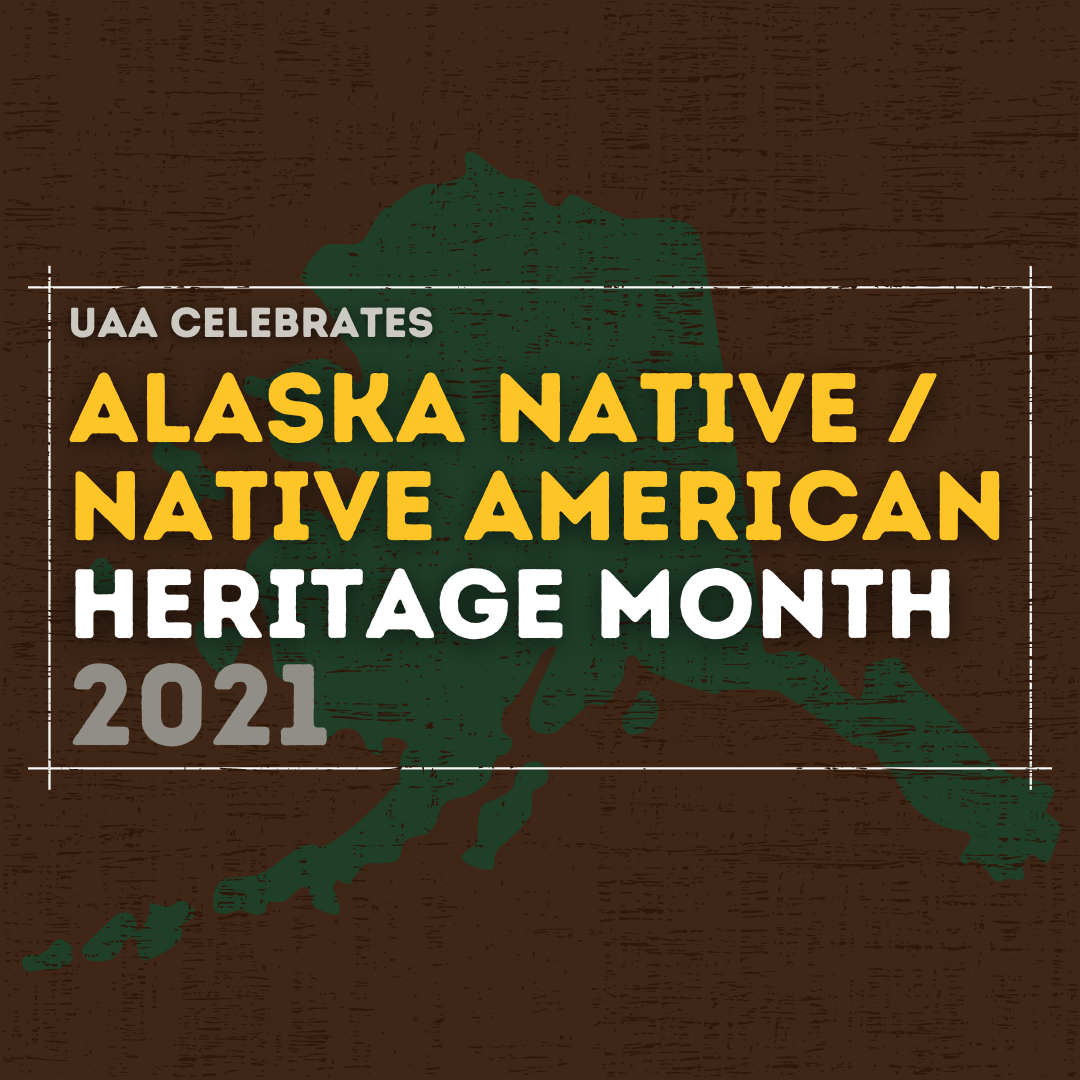
Alaska Native / Native American Heritage Events
November 3 | 5:00pm | Virtual | Conversation Cafe: Gender is a Colonial Construct
November 11 | 12:00pm | Student Union Den | Moving Beyond Land Acknowledgements & Token Representations
November 14 | 7:00pm | Virtual | Alaska Black Caucus panel: Indigenous Intersectionality
November 18 | 12:00pm | Virtual | Native Values Discussion
November 19 | 3:00pm | Virtual | Diversity Dialogue with Alaska Native Students
November 22 to 26 | Social Media | Alaska Languages and Land information Slide Deck
November 30 | 7:00pm | Multicultural Student Services & Virtual | Being IndigenousUAA / APU Consortium Library | Alaska Native/Native American Heritage Month
Native Student Services, Student Life and Leadership, Multicultural Student Services, Alaska Native, Indigenous, & Rural Outreach Program, Student Activities, Alaska Black Caucus, Recruitment & Retention of Alaska Natives into Nursing and Alaska Native Studies, UAA/APU Consortium Library.
-
Latinx Heritage Month (Sept. 15 - Oct. 15)
UAA is proud to celebrate Latinx Heritage Month Sept. 15 - Oct. 15. National Latinx/Hispanic Heritage Month celebrates and recognizes the contributions Latinx/Hispanic Americans have made to American society and culture and honors five of our Central American neighbors who celebrate their independence in mid-September. The recognition started with a week in 1968 and expanded to a month in 1988.
The word Hispanic, first coined by the Census Bureau as a means of categorization, refers to those who come from Spanish speaking countries. Latino/Latina (Latinx in gender expansive form) refers to those who come from countries in Latin America. While there is great overlap, not all Latin Americans speak Spanish and not all Hispanics are Latin American. The term Latinx also acknowledges the indigenous populations of Latin America who speak over 560 unique languages.
There is great diversity within Latinx communities, including ethnicity, food, music, folklore, art, religion, language and many of the other things celebrated during this month. To learn more about the variety of cultures, you can research specific countries of origin or learn about the immigration experiences of Hispanic/Latinx Americans. PBS has an extensive web series called Latino Americans that covers any topic you could want to know more about.
As always, when you are celebrating a culture that differs from your own, be sensitive to avoiding stereotypes about that culture. It is important to be aware of the difference between cultural appropriation and cultural appreciation, so that we are not disrespecting other people’s values, beliefs and norms.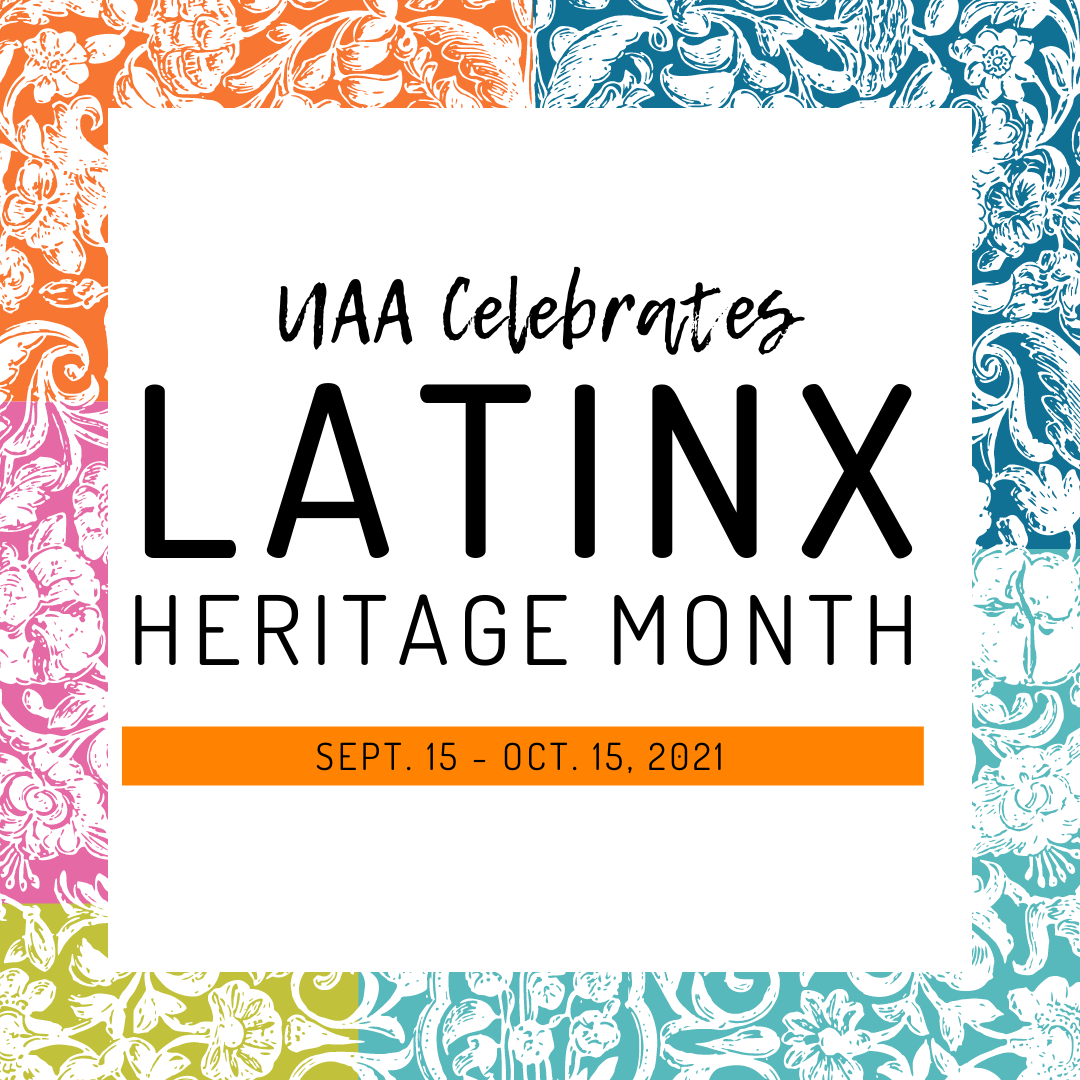
Latinx Heritage Month Events
Sept. 14 | All Day | Takeover Tuesday
Sept. 16 | UAA In The Community: Xalos
Sept. 23 | All Day | Online Trivia
Sept. 28 | 6:00pm | In The Heights Screening
Sept. 29 | 1:00pm | Conversation Cafe: Latinx Heritage Month
Sept. 29 | 7:00pm | Hugh McPeck Gallery Presents: George Rodriguez Artist Lecture
October 1 & 2 | Hugh McPeck Gallery Presents: George Rodriguez Guest Artist WorkshopAll Month
UAA/APU Consortium Library Guide
Follow UAALife on Instagram and Facebook for programming information and takeovers!
Sponsors: Student Life and Leadership, Student Activities, Multicultural Student Services, Career Services, Chief Diversity Officer, UAA/APU Consortium Library.
-
LGBTQ2S+ History Month (October)
UAA is proud to celebrate LGBTQ2S+ History Month. In 1994, a coalition of education-based organizations in the United States designated October as LGBTQ2S+ History Month. In 1995, a resolution passed by the General Assembly of the National Education Association included LGBTQ2S+ History Month within a list of commemorative months (Library of Congress).The month was selected to incorporate National Coming Out Day on October 11th.
LGBTQ2S+ is an acronym representing Lesbian, Gay, Bisexual, Transgender, Questioning and Two-Spirit. Some acronyms also include QIA at the end of LGBT, representing Queer (or Questioning), Intersex and Asexual. The acronym is an umbrella term meant to encapsulate a general community, but in no way is representative of all terminology, experiences or self-descriptions.
The month is celebrated in recognition of the history of LGBTQ2S+ civil movements and to demonstrate support and solidarity with the LGBTQ2S+ community. Information is available about the timeline and specific milestones in LGBTQ2S+ civil rights.
As always, when you are celebrating a culture that differs from your own, be sensitive to avoiding stereotypes about that culture. It is important to be aware of the difference between cultural appropriation and cultural appreciation, so that we are not disrespecting other people’s values, beliefs and norms.
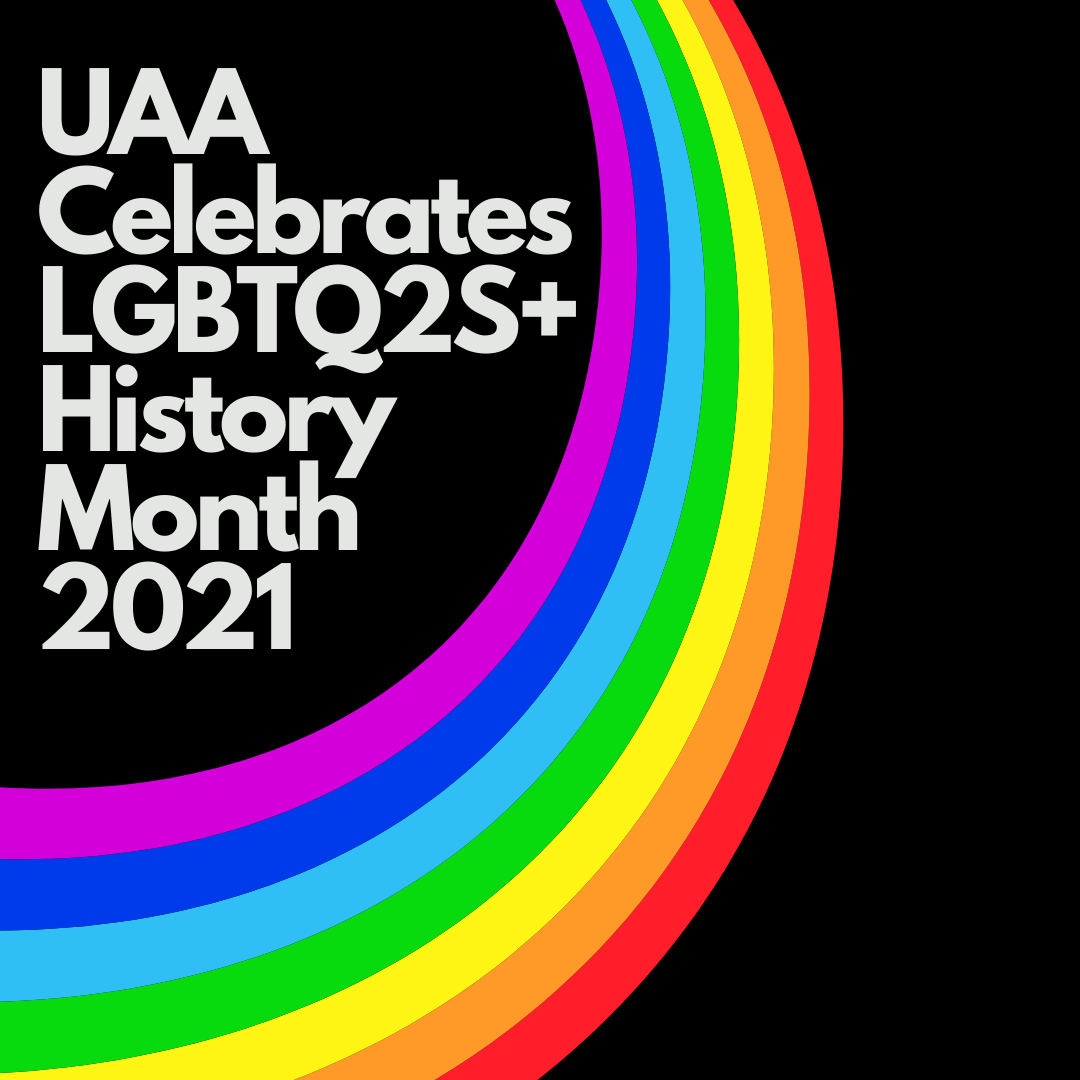
LGBTQ2s+ History Month Events
Oct. 20 | 6:00pm | Being QTBIPOC
Oct. 28 | 7:00pm | Queer Open Mic NightFollow UAALife on Instagram and Facebook for programming information and takeovers!
-
Filipino American History Month (October)
UAA is proud to celebrate Filipino American History Month. Filipino Americans are the second largest Asian American group in the United States. Filipino American History month is celebrated in October to commemorate the first recorded landing of Filipinos in America. This occurred in California in 1587. Congress gave official recognition to the month in 2009. Filipino Americans have a history going back over 200 years of living in Alaska. Called “Alaskeros” they were instrumental in working the canning industry and helping unionize cannery workers. Filipino Americans make up one of the largest ethnic groups in Alaska today.
For more information about the Filipino American experience, watch A Filipino American Story Since 1587 (7 minutes). For a modern and uniquely Alaskan perspective, read We Have Not Stopped Trembling Yet by UAA professor EJR David, PhD (available in text and e-text at the UAA Consortium Library).
As always, when you are celebrating a culture that differs from your own, be sensitive to avoiding stereotypes about that culture. It is important to be aware of the difference between cultural appropriation and cultural appreciation, so that we are not disrespecting other people’s values, beliefs and norms.
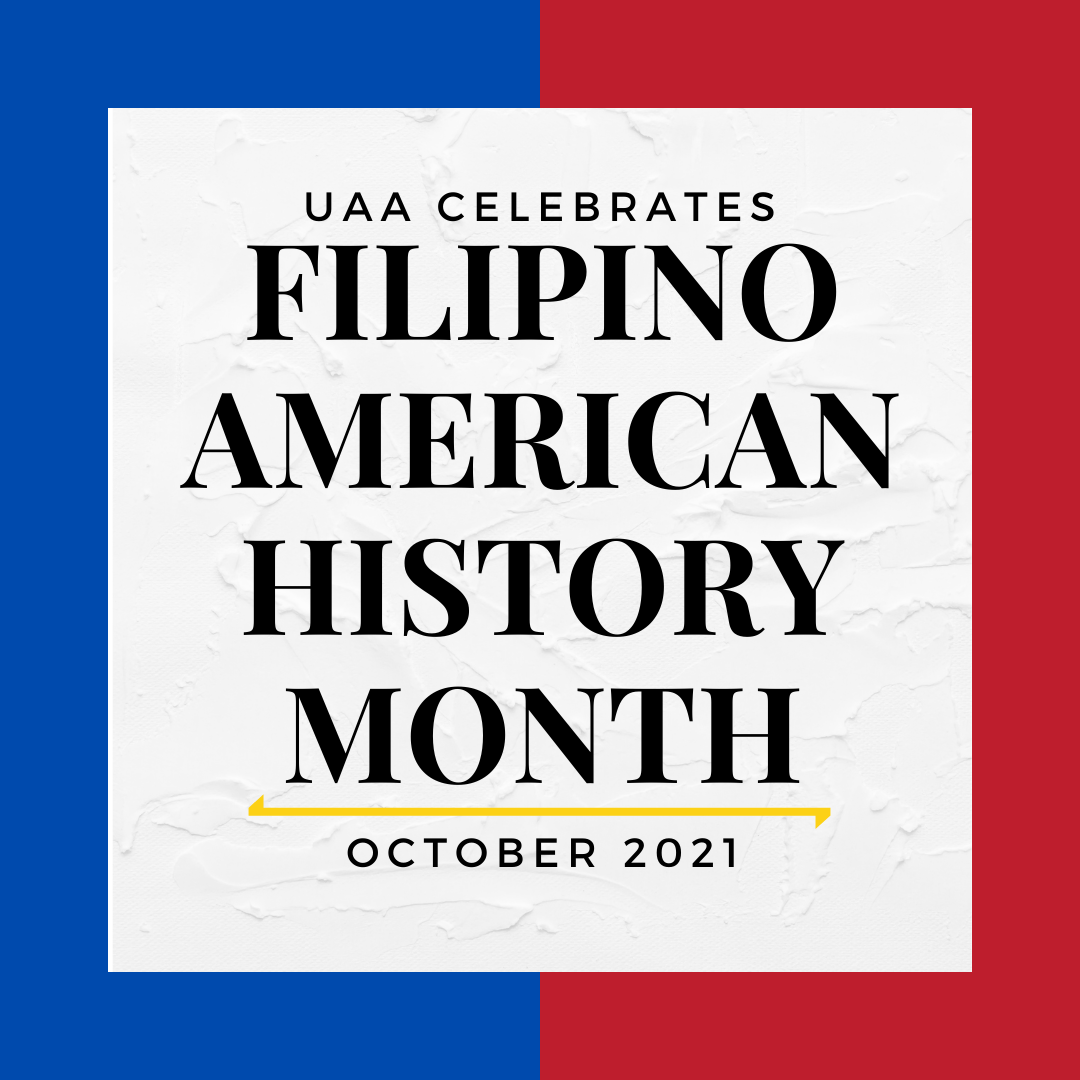
Filipino American History Month Events
Oct. 13 | 7:00pm | Open Mic Night With JR De Guzman
Oct. 22 | All Day | UAA Life Takeover
Week of Oct. 25 | Make Your Own Lumpia
Oct. 25 | 1:00pm | Being FilipinoUAA/APU Consortium Library Guide to Filipino American History Month 2021
Follow UAALife on Instagram and Facebook for programming information and takeovers!
-
Women's History Month (March)
- 2020-2021 Academic Year
-
Pride Month (June)
PRIDE refers to a celebration of all things lesbian, gay, bisexual, transgender, two-spirit (LGBT), as well as asexual, intersex, non-binary, queer and beyond! This includes LGBT history, music, fashion, celebrities, entertainment, culture and civil rights movements. Pride events are usually celebrated in June to celebrate the Stonewall riots in June 1969, when patrons of a New York gay bar protested and fought for their right to peacefully congregate.
You can learn more about the history of Pride movements at the History Channel website.
At UAA, we celebrate our LGBTQIA2S+ community with PRIDE everyday! This includes supporting students through student organization The Family, a new employee resource group (add link to event), history (October) and pride (June) month events, preferred name/gender pronoun selection in Banner, gender neutral restrooms, and LGBTQIA2S+ campus education/resource committee, and gender-neutral student housing.
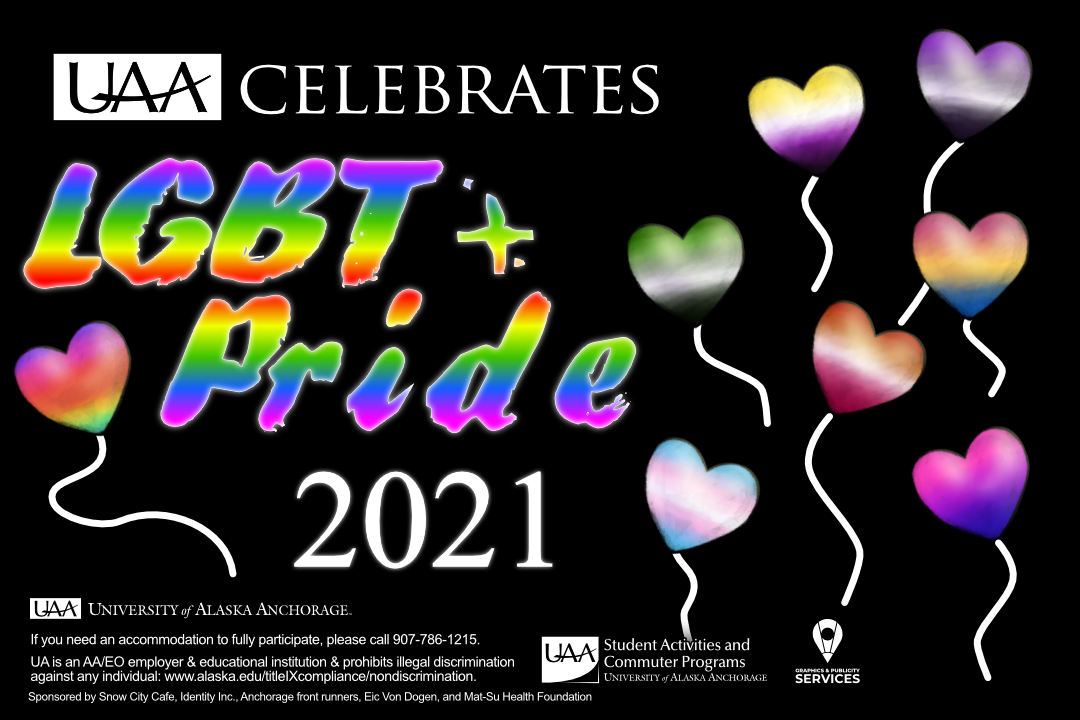
Pride Month Events
June 9 | 12:00pm | Lavender Leaders Panel
June 10 | 3:00pm | Faculty/Staff LGBT+ Resource Group Interest Meeting
June 12 | Until June 22 | Rainbow Run (Virtual 5K)
June 12 | 12:00pm | Soldotna Pride Walk 2021 (co-coordinated by LGBT: An Alliance Group at KPC)
June 17 | 10:00am | Translating Transgender Identity Abroad (Statewide)
June 22 | 6:00pm | Pride Pour Over Art
June 26 | 10:00am | Kodiak Pride Rainbow Run
June 26 | 2:00pm | Pride Block Party
June 30 | 6:00pm | Sunshine & Sandwiches Walk - YOUAA Celebrates Pride
All Month
Follow UAALife on Instagram and Facebook for programming information and takeovers!
Follow Career Services on Instagram & Facebook for inclusive LGBT+ inclusive workplace information.
Sponsors: Student Life and Leadership, Student Activities, Multicultural Center, Career Services, The Family, Native Student Services, Women’s and Gender’s Studies, LGBT Alliance at KPC, Chief Diversity Officer, Diversity Action Council
-
Asian American And Pacific Islander Heritage Month (May)
UAA is proud to celebrate Asian American and Pacific Islander (AAPI) Heritage Month. May was officially designated as AAPI Heritage Month in 1992. During this time, communities around the country celebrate the histories and contributions of Asian Americans and Americans from the Pacific Islands. These communities represent vastly diverse ethnicities, cultures, languages and histories in the United States.
The first Asians recorded in the US, on the West Coast in 1587, were from the Philippines. This was followed by Indians (East Asian, not Native American) at Jamestown, and the Chinese and Japanese in Hawaii at the turn of the 19th century. At the end of the 1800’s, people from Korea, Guam, Samoa and Vietnam all came to mainland US as well.
Much like in recent news, nationalist treatment of AAPI communities have long been frought with discrimination. The Chinese Exclusion Act, Japanese Internment during WWII, the colonization of Hawaii, Samoa and Guam, have caused great harm to these communities. Despite these atrocities, AAPI communities have made massive contributions to the success of the US in science, civil rights, technology, medicine and more.

AAPI Heritage Month Events
May 1 | 1:00pm | Asian Pacific Islander Month Community Kick-off
May 6 | 11:00am | UAA in the Community: Papaya Tree Food Truck
May 14 | 8:00am | Bystander Intervention To Stop Anti-asian/American Harassment And Xenophobia Workshop
May 20 | 1:00pm | Bystander Intervention To Stop Anti-asian/American Harassment And Xenophobia Workshop
May 24 | 12:00pm | Bystander Intervention To Stop Anti-asian/American Harassment And Xenophobia Workshop
May 27 | UAA in the Community: Papaya Tree Food Truck
All Month
Follow Career Services on Instagram & Facebook for AAPI highlights!
Follow UAALife on Instagram and Facebook for Student, Faculty and Staff Profiles!
Trivia on UAALife
UAA/APU Consortium Library Guide to AAPI Heritage Month
Use #YOUAA or #YOUAAPI to get a free AAPI Heritage Month T-Shirt
Check out the PBS Documentary Series: https://www.pbs.org/show/asian-americans/ & https://www.nps.gov/subjects/npscelebrates/asian-american-pacific-islander-heritage-month.htm
Fill out the interest form if you want to be part of a new student organization for AAPI students. https://forms.gle/yXBmQFBJQ6ZeKuC97
-
Diversity Month (April)
This April, the UAA campus community is celebrating Diversity Month by celebrating the YOU in UAA.
You're invited to participate in a social media-based program that will highlight the diverse stories of Seawolves across the campus community. Throughout April, the YOUAA committee will publish a series of profiles collected from students, faculty, staff and alumni that focus on representing and celebrating their unique identity.
When we talk about diversity, examples of identities may include (but are not limited to) racial, cultural, religious, sexual orientation-based, gender-based and/or ability-related identities, etc. We welcome any and all representation!
Interested in sharing your story? By completing and submitting this form, you may be selected to be featured on the uaalife Instagram and Facebook pages.
Questions about this opportunity? Contact Allie Hartman.

Diversity Month Events
April 7 | 12:00pm | Killing Me Softly: Suicide Among African American, Asian, Pacific Islander and LGBTQ+ Students
April 9 | 6:00pm | Veritas Forum
April 14 | 6:00pm | Philly D.A.
April 14 | 6:30pm | Big Questions: Are Science and Religion Compatible
April 15 | 11:00am | Papaya Tree
All Month | UAA's Got Talent
-
Womxn's History Month (March)
Womxn’s history month celebrates the unique contributions of womxn to American history. Womxn’s history month started as a week of celebration by a school district in California in 1978. The event grew until lobbyists convinced President Carter to declare a national week of celebration in 1980. In 1987, Congress declared March Womxn’s History Month.
Some major contributors to Womxn’s history include Susan B. Anthony, Sojourner Truth, Rosa Parks, Gloria Steinem, bell hooks, and so many more. Check out the amazing womxn’s history timeline from the History Channel to learn more about American womxn leaders throughout the decades. Alaska has also been a contributor to American womxn’s history through the work of many indigenous womxn trailblazers. Learn more (Not Available) about the contributions of Agnes Brown, Katie John, Elizabeth Peratrovich, Alberta Schneck Adams, and Clara Swan.
The Anchorage Museum is currently exhibiting Extra Tough: Women of the North. Through this exhibit, you can learn more about the everyday ways in which Alaskan womxn, particularly Alaska Native womxn, shape the history of the state and the Arctic region. During March 2021, please check out some of the events related to this exhibit.
*A note on the word WOMXN
Coming out of intersectional feminist circles and first used in 2010, the word womxn was added to many dictionaries in 2019. Womxn is intended to be a more inclusive term that acknowledges and indicates welcome for individuals who identify as women, including non-binary and trans women.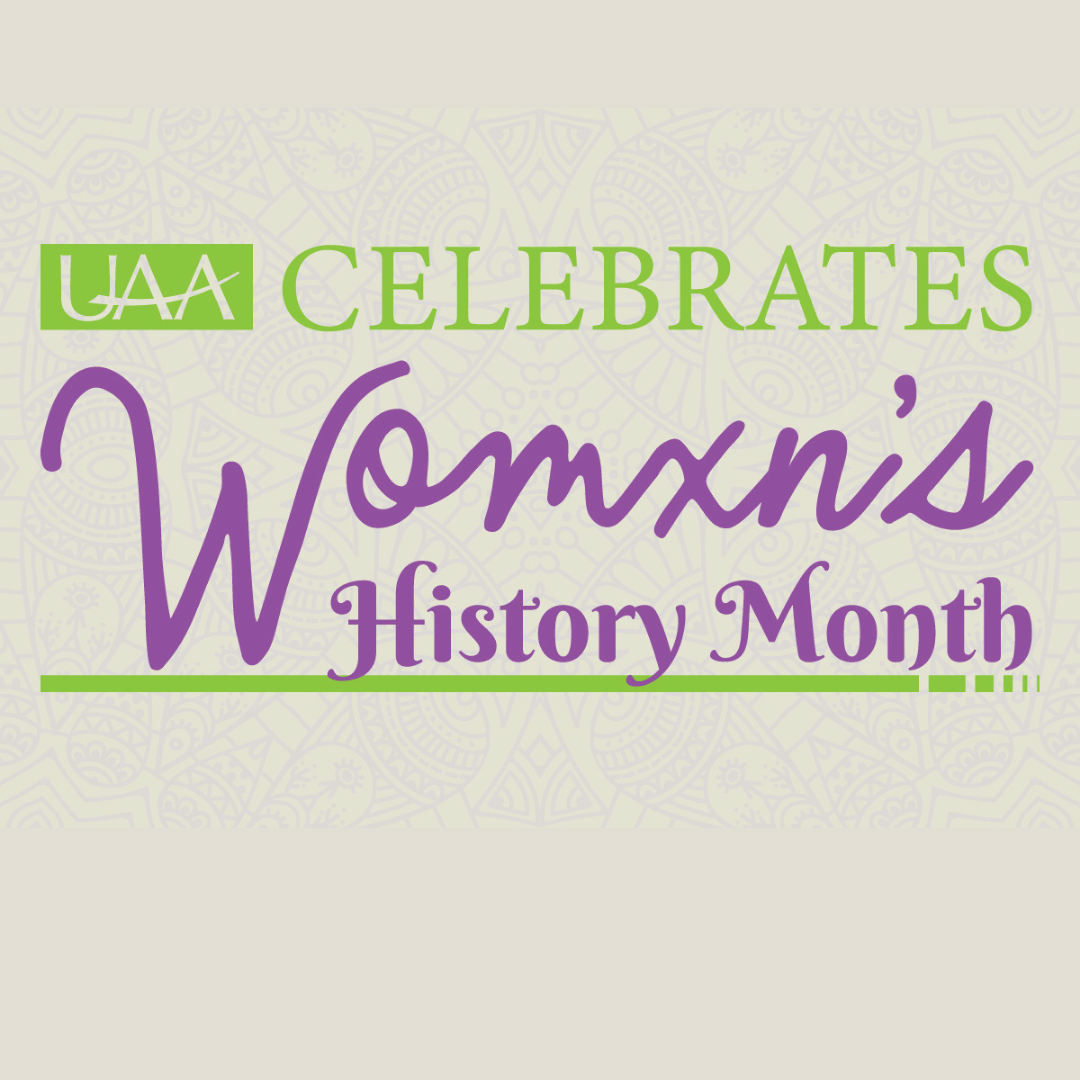
Womxn's History Months Events
March 1 | 6:00pm | Indie Lens Pop Up: 9 to 5
March 2 | All Day | Instagram Takeover
March 3 | 5:00pm | Maddie + Tae | University of Alaska Spring 2021 Virtual Tour
March 4 | 12:00pm | Extra Tough Women and Resilience in Crisis
March 5 | 4:00pm | Extra Tough Artist Spotlight: Suzy Lake + Allison Morris
March 4 | 7:30pm | UAA at the Movies: Legally Blonde
March 16 | 5:30pm | Warrior Women: Film and Discussion
March 19 | 6:00pm | Beat the Blame Game
March 20 | 7:00pm | UAA at the Movies: Promising Young Woman
March 25 | 6:30pm | Queer Femininity Panel
March 30 | 7:00pm | "Fair and Impartial Judges in Alaska" with Judge Elaine Andrews
All Month | Women’s History Month Library Guide
Social Media Trivia - Follow UAALife for weekly Trivia and the chance to win a $50 giftcard to a local business!
Sponsors: Student Life and Leadership, Multicultural Center, Student Activities, Native Student Services, Concert Board, Consortium Library, YouAA, Women’s Studies Program
-
Black History Month (February)
Black History Month started out in the United States in the ‘20s as a week that celebrated the birthdays of Abraham Lincoln and Frederick Douglass. Black History Month (BHM) was first celebrated as a full month in 1970 at Kent State University in Ohio. The month was recognized by the President of the United States in 1976.
Since then, Black History Month, sometimes referred to as African-American History Month, celebrations have included information on important historical events as well as leaders in African-American history such as Frederick Douglass, Harriet Tubman, Martin Luther King Jr., Malcolm X, Rosa Parks, James Baldwin and more.
In 2016, the U.S. opened the National Museum of African American History and Culture. It is the only national museum devoted exclusively to the documentation of African American life, history, and culture. You can explore the vast history of African Americans and attend virtual BHM events by checking out the museum’s extensive website.
In Alaska, African Americans have been a part of all aspects of development of the state going back almost two hundred years. This includes whaling, the military, engineering, building, and more. In 2020, UAA History professor Dr. Ian Hartman published Black History in the Last Frontier highlighting the achievements and contributions of Alaska’s Black community, while demonstrating how these women and men have endured racism, fought injustice, and made a life and home for themselves in the forty-ninth state. The book is available free for download from the National Park Service. -
Alaska Native/Native American Heritage Month (November)
UAA is proud to celebrate Alaska Native/Native American Heritage Month. In 1990, George H.W. Bush declared November to be Native American Heritage Month. It is now more commonly referred to as American Indian and Alaska Native Heritage Month. It is a time to celebrate the rich and diverse American Indian and Alaska Native histories and heritage, as well as educate ourselves about the historical and lived experiences of indigenous peoples who live(d) on the lands which became the United States.
There are five-hundred seventy-four (574) federally recognized American Indian and Alaska Native groups. Two-hundred and twenty-nine (229) of these groups are in Alaska. There are also hundreds of groups without federal recognition, who may have state recognition or no recognition at all.
In the lower 48, tribal nations are represented in 35 states across 334 recognized reservations. The current location of these sovereign nations and their lands is based on 500 years of colonization, removal, government treaties, and reorganization. The civil rights era of the 1960s saw movements for self-determination and self-government for American Indian nations. Today, seventy-eight percent of those who identify as American Indians live outside tribal lands. As of the last census AI/AN persons made up only 1.7% of the total US population, but are one of the fastest-growing populations with a 39% increase over the previous Census.
Alaska has a rich history of indigenous cultural practices. There are about 20 indigenous languages spoken in Alaska, and 11 of them are Dene’ or Athabascan, who are related to the Navajo and Apache in what is now New Mexico and Arizona. There 5 Inuit based languages; the Inupiaq of northern coastal Alaska, the Yupik of Saint Lawrence Island, the Yup’ik and Cup’ik of the Yukon-Kuskokwim region and Bristol Bay, the Sugpiaq or Alutiiq of Kodiak and the Alaska Peninsula, and the Unangax or Aleut of the Aleutian Chain, and there are the Eyak, Tlingit, Haida, and Tsimshian of the southeast archipelago. All of Alaska’s diverse indigenous populations have experienced difficult and dynamic transitions into the western culture and economy. The harshness of the geography and the lack of saleable resources in much of our state has left a few of Alaska’s indigenous cultures more intact if that were not the case. Annette Island, home of Alaska’s Tsimshian people, was developed before the Indian Reorganization Act of 1934, so it stands as the only reservation in Alaska. The rest of Alaska Tribes and Nations are organized into 12 Regional Corporations, Village Corporations and Tribal Nations due to the Alaska Native Claims Settlement Act (ANCSA) of 1971.
For more information on the diverse experiences and cultures of American Indians/Alaska Natives check out these resources:
National Congress of American Indians
Alaska Native Heritage Center
Native Movement
National Museum of the American Indian
Alaska Native Knowledge NetworkAs always, when you are celebrating a culture that differs from your own, be sensitive to avoiding stereotypes about that culture. It is important to be aware of the difference between cultural appropriation and cultural appreciation so that we are honoring and respecting other people’s values, beliefs, and norms.
-
LGBTQ2S+ History Month (October)
UAA is proud to celebrate LGBTQ2S+ History Month. In 1994, a coalition of education-based organizations in the United States designated October as LGBTQ2S+ History Month. In 1995, a resolution passed by the General Assembly of the National Education Association included LGBTQ2S+ History Month within a list of commemorative months (Library of Congress).The month was selected to incorporate National Coming Out Day on October 11th.
LGBTQ2S+ is an acronym representing Lesbian, Gay, Bisexual, Transgender, Questioning and Two-Spirit. Some acronyms also include QIA at the end of LGBT, representing Queer (or Questioning), Intersex and Asexual. The acronym is an umbrella term meant to encapsulate a general community, but in no way is representative of all terminology, experiences or self-descriptions.
The month is celebrated in recognition of the history of LGBTQ2S+ civil movements and to demonstrate support and solidarity with the LGBTQ2S+ community. Information is available about the timeline and specific milestones in LGBTQ2S+ civil rights.
As always, when you are celebrating a culture that differs from your own, be sensitive to avoiding stereotypes about that culture. It is important to be aware of the difference between cultural appropriation and cultural appreciation, so that we are not disrespecting other people’s values, beliefs and norms.

-
Filipino American History Month (October)
UAA is proud to celebrate Filipino American History Month. Filipino Americans are the second largest Asian American group in the United States. Filipino American History month is celebrated in October to commemorate the first recorded landing of Filipinos in America. This occurred in California in 1587. Congress gave official recognition to the month in 2009. Filipino Americans have a history going back over 200 years of living in Alaska. Called “Alaskeros” they were instrumental in working the canning industry and helping unionize cannery workers. Filipino Americans make up one of the largest ethnic groups in Alaska today.
For more information about the Filipino American experience, watch A Filipino American Story Since 1587 (7 minutes).
For a modern and uniquely Alaskan perspective, read We Have Not Stopped Trembling Yet by UAA professor EJR David, PhD (available in text and e-text at the UAA Consortium Library).
As always, when you are celebrating a culture that differs from your own, be sensitive to avoiding stereotypes about that culture. It is important to be aware of the difference between cultural appropriation and cultural appreciation, so that we are not disrespecting other people’s values, beliefs and norms.

-
Hispanic Heritage Month (Sept. 15 - Oct. 15)
UAA is proud to celebrate National Hispanic Heritage Month Sept. 15 - Oct. 15. National Hispanic Heritage Month celebrates and recognizes the contributions Hispanic Americans have made to American society and culture and honors five of our Central American neighbors who celebrate their independence in mid-September. The recognition started with a week in 1968 and expanded to a month in 1988.
The word Hispanic, first coined by the Census Bureau as a means of categorization, refers to those who come from Spanish speaking countries. Latino/Latina (Latinx in gender-neutral form) refers to those who come from countries in Latin America. While there is great overlap, not all Latin Americans speak Spanish and not all Hispanics are Latin American.
There is great diversity within Hispanic/Latinx communities, including ethnicity, food, music, folklore, art, religion, language, and many of the other things celebrated during this month. To learn more about the variety of cultures, you can research specific countries of origin or learn about the immigration experiences of Hispanic/Latinx Americans. PBS has an extensive web series called Latino Americans that covers any topic you could want to know more about.
As always, when you are celebrating a culture that differs from your own, be sensitive to avoiding stereotypes about that culture. It is important to be aware of the difference between cultural appropriation and cultural appreciation, so that we are not disrespecting other people’s values, beliefs, and norms.
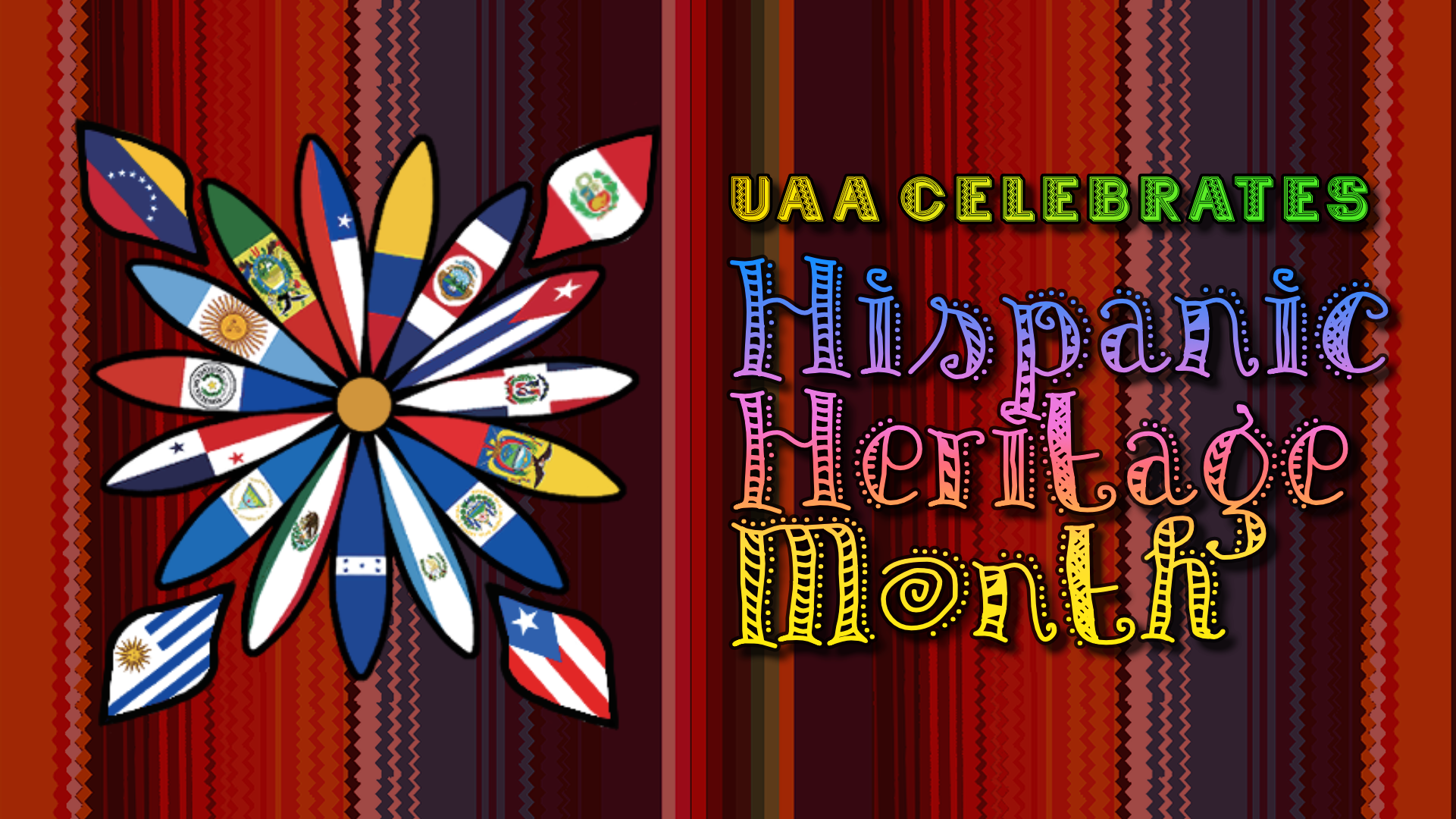
-
Pride Month (June)
- 2021-2022 Academic Year
Current Initiatives
DEI-Related Academic Programs and Centers
- Alaska Native Community Advancement in Psychology (ANCAP)
- Alaska Native Science & Engineering Program (ANSEP)
- Alaska Native Studies
- Diversity Related Courses
- International Studies
- Languages
- Model United Nations of Alaska
- Montgomery Dickson Center for Japanese Language & Culture
- Recruitment and Retention of Alaska Natives into Nursing (RRANN)
- Women's Studies
Committees
- Campus Climate Committee
- Diversity Action Council (DAC)
- Faculty Senate Diversity Committee
Student Resources
- AHAINA (African American, Hispanic, Asian/Pacific Islander/International and Native American students)
- Disability Support Services
- International Student Services
- Multicultural Student Services
- Native Student Services (NSS)
- First-generation Students: TRiO Programs
- Residence Life/Housing Alaska Native, Indigenous & Rural Outreach Program (ANIROP) and the Cama-i Room
- UAA Clubs
Faculty and Staff Resources
- AHAINA (African American, Hispanic, Asian/Pacific Islander/International and Native American students)
- Alaska Natives
- Consortium Library books on diversity
- Office of Equity & Compliance
- Office of International & Intercultural Affairs
- Training: Center for Advancing Faculty Excellence
- Training: Center for Community Engagement & Learning
- Training: National Coalition Building Institute (NCBI)
- Training: SafeZone (LGBT Awareness and Allyship)











